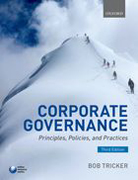
An authoritative analysis of corporate governance, outlining the origins of corporate regulation and evaluating its development following the global financial crisis. Clear three part structure logically introduces the theories, policies, and practical applications of the subject. Numerous international case studies illustrate corporate governance in real-world organizations, including News International and Olympus, Japan. A dedicated chapter on 'Corporate governance around the world' provides a comparative perspective and evaluates the impact of culture on governance in regions such as North Africa, the Middle East, and Asia. A range of learning features, including projects, exercises, and two-colour diagrams, support and develop the reader's understanding. Self-test questions at the end of every chapter, combined with accompanying solutions at the end of the book, allow students to compare their answers to the solutions and check their progress throughout. New to this edition Full coverage of new developments in the subject, including ethical culture, aggressive tax avoidance, attitudes to risk, executive remuneration, and whistle-blowing. Comprehensively updated to address key changes in company law and new corporate regulation. Provides a diverse range of new case studies, including examples from HBOS Bank, Goldman Sachs, and News International. Includes additional coverage of global attitudes to the role of women on executive boards and ideas from around the world on the issue of quotas. Written by the 'father of corporate governance', this text is an authoritative guide to the frameworks of power that govern organizations. The third edition covers key developments since the financial crisis, including aggressive tax avoidance, executive pay, and whistle-blowing. The book is divided into three clear parts that firstly outline the models and principles of governance, before analysing corporate policy, codes, and practice. International case studies provide real-world examples and a chapter dedicated to global corporate governance illustrates regulation in such diverse regions as Brazil, Russia, the Middle East, and North Africa. This comparative perspective ensures students are able to evaluate the importance of culture in various attitudes to governance. In addition, self-test questions, with solutions provided at the end of the text, enable the reader to directly test their knowledge and assess their progress throughout. This complete approach ensures students have a fundamental understanding of all aspects of corporate governance and its essential role in real-world business practice. The textbook is accompanied by an Online Resource Centre, which includes: For students - Use the author blog to gain insight into current events in the world of business, economics and finance. The blog is updated by OUP authors and subject experts Bob Tricker and Christine Mallin. - Take your learning further with relevant web links to reliable online content related to each chapter. - Get the most from the case studies in the book by using our additional case study resources to support your online research. For registered lecturers - Additional case studies of varying lengths can be used in class to generate discussion and debate. - Teaching notes support both the case studies and the projects from the book. - PowerPoint slides can be used as a basis for lecture presentations or as hand-outs in class. - Suggested group exercises enable students to put their teamwork skills into practice.
- ISBN: 978-0-19-870275-7
- Editorial: OXFORD UNIVERSITY PRESS.
- Encuadernacion: Rústica
- Páginas: 544
- Fecha Publicación: 26/02/2015
- Nº Volúmenes: 1
- Idioma:
